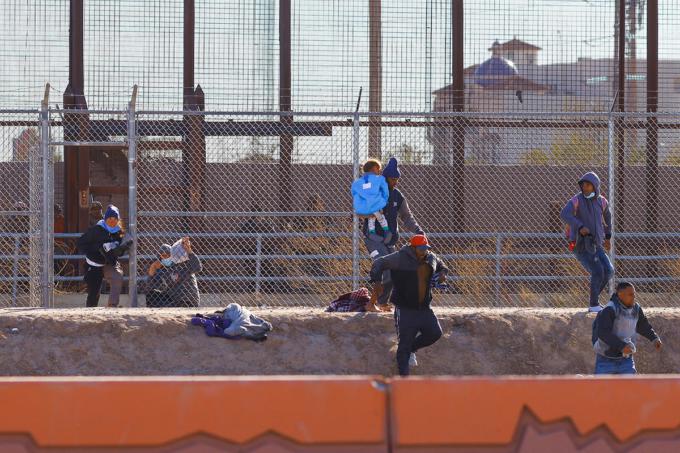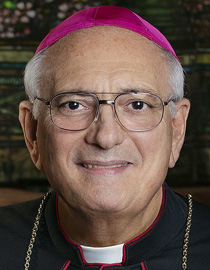
Faith

. . . Massive deportation of migrants has not occurred since the beginning of the Bracero Program, which was a labor agreement between the U.S. and Mexico which ended in 1964.

DiMarzio
Now that the slate for president and vice president have been firmed up by both parties, the issue of immigration certainly is paramount in their presentations. Even more so is the spending that is done on the media on the issue of immigration.
An independent media impact company, Impact, shows that the Democrats have increased their immigration TV ads spent by 5 percent to $6.2 million, while the GOP and other related groups have increased their anti-immigration (their characterization) TV spending to over $37 million, a 120 percent increase, from June to July. The spending is localized to the 12 critical states for presidential and congressional elections.
Like it or not, we are influenced by the media and what we see on our TV screens, hear on the radio and read in the print media. The media is a trusted pillar of society.
For some time, the so-called pillars of society are those institutions which influence our society. Unfortunately, there is no universal agreement on these pillars. Most comprehensive is the seven-pillar theory, which includes government, media, arts and entertainment, business, education, religion and family. The nexus between media and religion is found in the same sentence of our Constitution which upholds the right to free speech and the practice of religion. The only common element to be found in both is that both are instruments to bring the truth to society.
In my August 2024 article, I spoke about the influence of Catholic teaching on migration and concluded by reviewing some research which found that although Catholic thinking was known, political and psychological orientations have much more influence on voters.
Unfortunately, we recognize that the media has much more influence on our daily life than we would like to admit. This is certainly true about the information that we receive on immigration in political campaigns. The motto seems to be: spend to influence the votes you want. However, the quality of the information we receive is seldom fact checked by the media outlets, which accept paid political information. This certainly is true when it comes to immigration issues.
Perhaps by pointing out some of the more egregious errors, we might come to a better decision for whom we should vote in the upcoming election, at least in regard to immigration policy.
Deportation has always been part of our immigration policy, especially in regard to criminal aliens. Unfortunately, the massive arrival of asylum-seekers has given this policy more credence than it deserves. Many migrants are intercepted soon after arrival and returned to their home countries at government expense. But massive deportation of migrants has not occurred since the beginning of the Bracero Program, which was a labor agreement between the U.S. and Mexico which ended in 1964. The result was that many of those deported eventually returned to fill the jobs that they had left. This seems to be the pattern that occurs even today.
A recent study on the results of an immigration raid in Mississippi and the deportation of almost an entire workforce in the poultry industry demonstrates that certain industries rely on entry level immigrant labor to fill their workforce. As soon as some were deported, others arrived to fill those empty jobs which are undesirable to our native-born population, not only because of salary but also because of working conditions. Christopher Ross, an attorney from South Jersey and vice president for immigration at Catholic Charities USA, documented this Mississippi immigration raid looking back after five years.
Workplace enforcement is critical in curbing the flow of undocumented immigration, because migrants come to work and if they cannot find jobs they will not come. The Immigration Act of 1987 amended the Immigration and Nationality Act to revise numerical limitations for immigrant admissions with respect to family reunification immigrants and independent immigrants. This included workplace enforcement which was never fully implemented either because of a lack of resources or an unwillingness to disturb the labor market. Employers resisted this enforcement policy.
New electronic systems of verifying Social Security numbers are one way to enforce Labor Standards.
If we were to protect the labor market more closely, reason dictates that it must be accompanied by a legalization of those already in the workplace. Never before has immigration become a key issue in a presidential election. However, the solution of this social policy problem will only occur when the true facts are known and when our political system regains the political tools of collaboration and compromise.
- Bishop Nicholas DiMarzio is retired bishop of the Diocese of Brooklyn, N.Y. He writes the column "Walking With Migrants" for Catholic News Service and The Tablet.
Recent articles in the Faith & Family section
-
The Christmas crecheFather Robert M. O'Grady
-
Feeling like ChristmasJaymie Stuart Wolfe
-
Parish priests and their peopleMsgr. Frank Kelley
-
Be the carolArchbishop Richard G. Henning
-
Give a Christmas Gift to the MissionsMaureen Crowley Heil


















